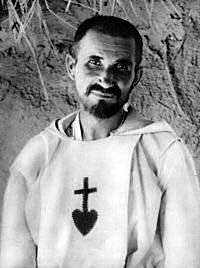Readings:
Habakkuk 3:17-19
Psalm 73:24-29
James 1:1-11
John 16:25-33Preface of a Saint (3)
[Common of a Martyr]
[Common of a Monastic or Professed Religious]
[Of the Holy Cross]
[Of the Incarnation]
PRAYER (traditional language)
Loving God, help
us to know thee wherever we find thee, that with thy servant Charles de Foucauld, we may be faithful
even unto death; through Jesus Christ, who liveth and reigneth with thee and
the Holy Ghost, one God, now and for ever. Amen.
PRAYER (contemporary language)
Loving God, help us to know you wherever we find you and seek to serve you in all people, that with your servant Charles de Foucauld, we may be faithful even unto death; through Jesus Christ, who lives and reigns with you and the Holy Spirit, one God, now and for ever. Amen.
Lessons revised at General Convention 2024.
Return to Lectionary Home Page
Webmaster: Charles Wohlers
Last updated: 5 Oct. 2024
CHARLES DE FOUCAULD
MONASTIC AND MARTYR,
1916

Charles Eugene, viscount of Foucauld, was born in 1858. He served as a French Army officer in Algieria beginning in 1881, and prepared a mapping of oases in Morocco in 1883. In 1886 he underwent a religious conversion, and in 1890 he joined a Trappist monastery, but soon left to become a solitary hermit in Palestine. In 1901 he went to Algeria, where he eventually settled at Tamanrasset and there lived the life of a missionary priest and prepared a Taureg dictionary. He was killed in an anti-French uprising on 1 December 1916, by those who said that his goodness tended to create friendly feelings toward the French.
In 1933 and 1939 respectively, groups of dedicated Christians were formed in Algeria known as the Little Brothers of Jesus and the Little Sisters of Jesus, inspired by his ideas and example. Members of these groups went to live in small communities, called fraternities, in areas where the people were largely poor. They supported themselves by doing the same kind of work as their neighbors. They made no explicit attempt to convert their neighbors or to debate with them. Their purpose is simply to live among them as Christians. They say that Christ did not come to earth primarily to teach (there were already teachers) but to share our human lot. They seek to express the love of Christ for the wretched of the earth by living among them and sharing their lives and their hardships. For example, on one occasion a brother became ill, and it would have been possible to send him home where he would have received European-style medical care and would almost certainly have recovered. However, this would have been an option not open to those who lived around them. Accordingly, the brother stayed in the fraternity, receiving only the treatment that a native of the area would have received, knowing that this meant that he would soon die, which he did.
by James Kiefer